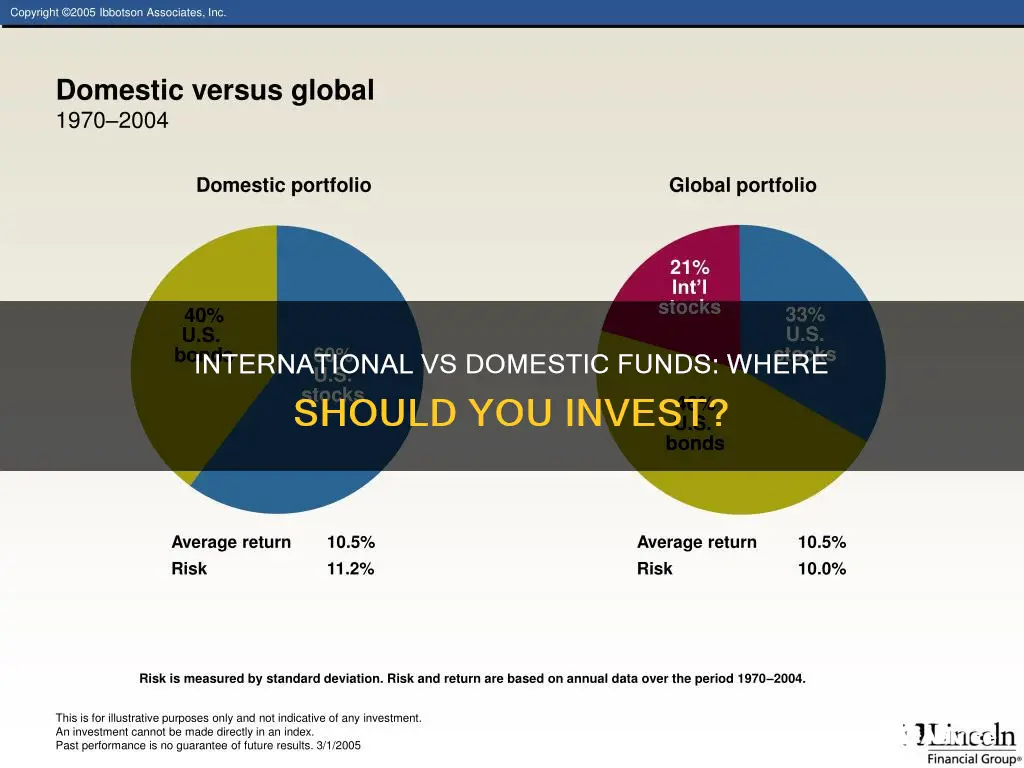
Investing in international funds can be a great way to diversify your portfolio and reduce risk. While it may seem daunting to venture into unfamiliar markets, international funds can provide access to hundreds or even thousands of foreign securities. This diversification can help to level out the volatility in your portfolio, as markets outside the United States don't always rise and fall at the same time as the domestic market.
There are several types of international funds, including emerging market funds, developed market funds, and country-specific funds. Each type of fund comes with its own set of risks and potential rewards. For example, emerging market funds invest in countries with developing economies, which may be experiencing rapid growth but also carry more risk. On the other hand, developed market funds focus on more stable and mature markets.
When considering whether to invest in international or domestic funds, it's important to weigh the advantages and disadvantages of each. International funds can offer greater capital appreciation and a broader variety of income sources. They also provide exposure to different currencies and sectors, reducing the impact of a single stock's performance or a single country's instability on your portfolio. However, international investing carries unique risks, such as currency fluctuations and changes in economic, political, or regulatory conditions, especially in emerging markets.
Ultimately, the decision to invest in international or domestic funds depends on your investment goals, risk tolerance, and comfort level with different markets. It's essential to do your research and understand the risks and potential benefits before making any investment decisions.
| Characteristics | Values |
|---|---|
| Pros of investing in international funds | Enhanced diversification, potential for better risk-adjusted returns, greater capital appreciation, broader variety of income sources, and more growth potential. |
| Cons of investing in international funds | More expensive to own than U.S. stocks, less tax-efficient, currency risk, political risk, and reduced liquidity. |
| Pros of sticking to domestic funds | Lower risk, better performance, and lower costs. |
| Cons of sticking to domestic funds | Less diversification, less growth potential, and more volatility. |
What You'll Learn
- International funds can offer greater capital appreciation than domestic funds
- International funds can provide diversification benefits
- International funds can be riskier than domestic funds
- International funds can be more expensive than domestic funds
- International funds can be less tax-efficient than domestic funds

International funds can offer greater capital appreciation than domestic funds
Firstly, international funds provide access to a diverse range of foreign securities, reducing the risk of volatility in an investment portfolio. Markets outside the domestic market do not always rise and fall simultaneously, so owning a mix of international and domestic securities can balance out the volatility associated with solely holding domestic securities.
Secondly, international funds offer exposure to solid markets in developed countries, as well as emerging markets with higher growth potential. While developed markets like the UK, Japan, and France are considered stable and less risky, emerging markets like India, China, and Brazil carry more risk but also offer higher potential returns.
Thirdly, international funds provide investors with global reach and the opportunity to own shares in some of the best corporations worldwide. This allows investors to benefit from the growth and performance of companies in different countries and industries, which can lead to greater capital appreciation over time.
Additionally, international funds can provide currency diversification. Currency exchange rates fluctuate, and investing in international funds can either positively or negatively impact the dollar value of an investment. For investors from developing countries, a depreciating local currency can lead to better gains when investing in international funds.
Lastly, investing in international funds can offer a broader variety of income sources compared to solely investing in domestic stocks. This growth potential is crucial for individuals saving for retirement or other long-term financial goals, helping their savings keep pace with inflation.
In conclusion, international funds have the potential to offer greater capital appreciation than domestic funds due to their diverse range of investment opportunities, access to emerging markets, global reach, currency diversification, and broader income sources. However, it is important to remember that investing in international funds also carries greater risks, including economic, political, and regulatory uncertainties, as well as currency fluctuations.
Strategies for Investing Your Self-Managed Super Fund
You may want to see also

International funds can provide diversification benefits
By investing in international funds, investors can access hundreds or even thousands of foreign securities, thus diversifying their portfolio beyond what would be possible with domestic investments alone. This diversification can smooth out returns during periods of unpredictability and lower the overall risk of the portfolio.
Additionally, international funds can provide geographical, currency, and sector diversification, reducing the chances that the performance of a single stock or instability in a single country will negatively impact the entire portfolio.
For example, an investor with a portfolio consisting mainly of domestic investments may choose to purchase an international fund to diversify their risk. Alternatively, a speculator may invest in an international fund if they anticipate a rise in a particular foreign market.
It is worth noting that international funds can invest in solid markets of developed countries or emerging markets, which carry more risk but also offer the potential for higher returns.
How to Invest Your Roth IRA Funds
You may want to see also

International funds can be riskier than domestic funds
Firstly, international funds carry a higher level of risk due to their exposure to foreign markets and economies. Political and economic instability in other countries can impact the value of investments, and regulations may differ from those in your home country, offering less protection for investors. Country-specific funds, for example, carry the risk of having a portfolio dependent on a single economy, which increases the risk factor.
Secondly, currency risk is a significant consideration. Currency exchange rates fluctuate constantly, and these fluctuations can impact the value of your investment. While a falling dollar value can increase returns on foreign stocks, it can also work against investors, reducing the dollar value of an investment even if the security's price remains the same.
Thirdly, emerging markets, such as those in developing countries, carry more risk due to less regulated markets and economies. These markets tend to be more volatile, and political and economic conditions can be less stable, increasing the potential for losses.
Additionally, investing in international funds may provide less tax efficiency compared to domestic funds, as was noted in the case of Vanguard's International Index Fund. Higher dividend yields and the challenges of managing a portfolio in less liquid international stock markets can result in higher taxes.
Finally, investing in international funds may be more expensive due to higher expense ratios. For example, Vanguard's Total International Stock Index Fund has an expense ratio of 0.11%, while their Total Stock Market Index Fund has a lower ratio of 0.04%. These small differences can add up to significant amounts over time.
In conclusion, while international funds offer the benefits of diversification and exposure to global markets, they also carry higher risks that investors should carefully consider before committing their capital.
Mutual Fund Investment: Choosing the Right One
You may want to see also

International funds can be more expensive than domestic funds
Firstly, international stocks have slightly higher expense ratios than US index funds. For example, Vanguard's Total International Stock Index Fund (VTIAX) has an expense ratio of 0.11%, while its Total Stock Market Index Fund (VTSAX) and S&P 500 Index Fund (VFIAX) have expense ratios of 0.04%. This means that on a $1 million portfolio, the difference in fees would be $700 per year.
Secondly, international stock funds are less tax-efficient than US stock funds. This is partly due to the higher dividend yield of international index funds, and partly due to the inefficiencies of managing a portfolio invested in less liquid international stock markets. For instance, over the past 5 years, the potential amount of returns lost to taxes (before even selling the index fund) for the Vanguard International Index Fund VTIAX was 0.91%, compared to 0.63% for VTSAX (Vanguard Total Stock Market Index Fund), according to Morningstar's Tax Analysis Tool for ETFs and mutual funds.
Thirdly, there are currency risks involved in international funds. The exchange rate between a country's currency and the US dollar is constantly fluctuating, which can impact the dollar value of an investment, even if the security's price remains the same. However, currency fluctuations can also work in your favour. For example, returns on foreign stocks are increased when the dollar's value falls relative to other currencies.
Finally, there are additional costs and expenses involved in investing in international funds, such as underlying costs and expenses.
Currency Funds: Diversify Your Portfolio and Gain Globally
You may want to see also

International funds can be less tax-efficient than domestic funds
However, it is important to note that international stock funds do offer some tax benefits, such as the foreign tax credit. By placing international stocks in a tax-deferred or retirement account, investors can avoid the negative impact of international funds' relative tax inefficiency.
Additionally, international funds can provide tax benefits in the form of currency fluctuations. For investors from developing countries, a depreciating domestic currency can lead to better gains in international funds.
When considering investing in international funds, it is crucial to carefully examine the underlying costs and expenses associated with the fund, including any applicable taxes.
Furthermore, it is worth noting that regulations prohibit individuals from purchasing mutual funds based in another country. Therefore, to diversify into foreign countries, one must invest in a mutual fund in their own country that purchases foreign securities. This adds an extra layer of complexity and potential costs to the investment process.
In conclusion, while international funds may offer certain tax benefits, they generally tend to be less tax-efficient than domestic funds. Investors should carefully consider the tax implications and consult with a financial advisor before making any investment decisions.
Equity Funds: Where to Start and How to Invest
You may want to see also
Frequently asked questions
International and global stock funds can be an important part of a diversified portfolio. They can offer investors multiple layers of diversification, including geographical, currency, and sector, thus reducing the chances that the performance of a single stock or instability in a single country can negatively impact the performance of the entire portfolio.
As with any investment, international investing carries risks, including some unique to international markets, such as currency risk or changes to economic, political, or regulatory conditions. These risks can be magnified in emerging or developing countries due to their less regulated markets and economies.
Domestic funds have outperformed their international peers over a long period of time. They are also more tax-efficient than international stock funds.
Domestic funds do not offer the same level of diversification as international funds.







